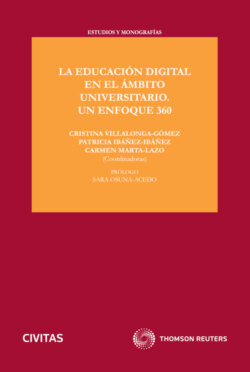Читать книгу La educación digital en el ámbito universitario. Un enfoque 360 - Patricia Ibáñez Ibáñez - Страница 20
На сайте Литреса книга снята с продажи.
VII. REFERENCIAS BIBLIOGRÁFICAS
ОглавлениеAltbach, P.G. (2014). MOOCs as Neocolonialism: Who controls knowledge? International Higher Education, 75, pp. 5-7.
Antonaci, A., Klemke, R., Stracke, C.M., y Specht, M. (2017). Gamification in MOOCs to enhance users’ goal achievement, en IEEE Global Engineering Education Conference. EDUCON, pp. 1654-1662.
Borrás Gené, O., Martínez Núñez, M., y Fidalgo Blanco, A. (2014). Gamification in MOOC: Challenges, Opportunities and Proposals for Advancing MOOC Model, en TEEM´14, pp. 215-220.
Borrás Gené, O., Martínez-Núñez, M., y Fidalgo-Blanco, A. (2016). New Challenges for the motivation and learning in engineering education using gamification in MOOC. International Journal of Engineering Education, 32(1), 501-512.
Castaño-Muñoz, J., Kreijns, K., Kalz, M., y Punie, Y. (2017). Does digital competence and occupational setting influence MOOC participation? Evidence from a cross-course survey. Journal of Computing in Higher Education, 29(1), 28-46.
Comisión Europea. (Ed.) (2019). The Digital Competence Framework 2.0, Bruselas, Bélgica. https://ec.europa.eu/jrc/en/digcomp/digital-competence-framework
Daniel, J. (2012). Making sense of MOOCs: Musings in a maze of myth, paradox and possibility. Journal of Interactive Media in Education, 3, 1-20.
Deterding, S., Dixon, D., Khaled, R., y Nacke, L. (2011). From Game Design Elements to Gamefulness: Defining “Gamification” [Conference]. Proc. 2011 Annu. Conf. Ext. Abstr. Hum. factors Comput. Syst. – CHI EA’11, Tampere, Finland, pp. 9-15.
García-Martínez, V., Aquino-Zúñiga, S.P., y Ramírez-Montalvo, N.A. (2016). Digital Literacy Program in Mexico (1:1). Comparative análisis, CPU-e, Revista de Investigación Educativa, 23, 24-44.
González, C. S., Collazos, C. A., y García, R. (2016). MOOC Design Challenges: Incorporating Collaboration and Gamification Aspects. Revista de Educación a Distancia (RED), 48, 1-23.
Guajardo-Leal, B.E., Navarro-Corona, C., y Valenzuela González, J.R. (2019). Systematic Mapping Study of Academic Engagement in MOOC. International Review of Research in Open and Distributed Learning, 20(2), s/p.
Hernández, E.E., Romero, S.I., y Ramírez, M.S. (2015). Evaluation of Digital Didactic Skills in Massive Open Online Courses: a contribution to the Latin American Movement. Comunicar, 22(44), 81-90.
Kizilcec, R. F., Piech, C., y Schneider E. (2013). Deconstructing Disengagement: Analyzing Learner Subpopulations in Massive Open Online Courses. Lak’13. Leuven, Belgium, p. 10.
Martin, A. (2008). Digital Literacy and the Digital Society. En Digital Literacies: Concepts, Policies and Practices, C. Lankshear, y M. Knobel (Eds.), Peter Lang, 151-176.
Norris, P. (2001). Digital divide: Civic engagement, information poverty, and the Internet worldwide. Cambridge University Press.
Osuna-Acedo, S., Marta-Lazo, C., y Frau-Meigs, D. (2018). From sMOOC to tMOOC, learning towards professional transference: ECO European Project. Comunicar, 26(55), 105-114.
Pérez-Escoda, A., Castro-Zubizarreta, A., y Fandos-Igado, M. (2016). Digital Skills in the Z Generation: Key Questions for a Curricular Introduction in Primary School. Comunicar, 24(49), 71-80.
Pérez-Rodríguez, M.A., y Delgado-Ponce, A. (2012). From Digital and Audiovisual Competence to Media Competence: Dimensions and Indicators. Comunicar, 20(39), 25-34.
Ragnedda, M., y Muschert, G. (eds). (2013). The digital divide: The Internet and social inequality in international perspective. Routledge. London, UK.
Reich, J. (2014). Learner Intention Recasts “Low” MOOC Completion Rates. HarvardX: http://harvardx.harvard.edu/news/learner-intention.
Rincón-Flores, E. G., Ramírez Montoya, M. S., y Mena, J. (2016). Challengebased gamification as a teaching’ Open Educational Innovation strategy in the energy sustainability area en TEEM´16. Salamanca, España, pp. 1127-1131.
Romero-Rodríguez, L.M., De-Casas-Moreno, P., y Torres-Toukoumidis, A. (2016). Dimensions and Indicators of the Information Quality in Digital Media. Comunicar, 24(49), 91-100.
Romero-Rodríguez, L.M., Ramírez-Montoya, M.S., y Valenzuela-Gonzalez, J.R. (2019). Gamification in MOOCs: Engagement Application Test in Energy Sustainability Courses. IEEE Access, 7(1), 32093-32101.
Romero-Rodríguez, L.M., Ramírez-Montoya, M.S., y Aguaded, I. (2020). Determining Factors in MOOCs Completion Rates: Application Test in Energy Sustainability Courses. Sustainability, 12, 2893.
Romero-Rodríguez, L.M., Torres-Toukoumidis, A., Pérez-Rodríguez, M.A., y Aguaded, I. (2016). Analfanauts and Fourth Screen: Lack of Infodiets and Media and Information Literacy in Latin American University Students. Fonseca Journal of Communication, 12, 11-25.
Thomson, K., Jaeger, P., Greene, N., Subramanian, M., y Bertot, J. (2014). Digital Literacy and Digital Inclusion. Rowman y Littlefield, Maryland, Estados Unidos.
Valdivia, V., J.A., Ramírez-Montoya, M.S., y Valenzuela-González, J.R. (2018). Motivation and Knowledge: Pre and Post Assessment of MOOC participants from an Energy and Sustainability Project. The International Review of Research en Open and Distributed Learning, 19(4), 116-132.
Van Dijk, J. (2006). Digital divide research, achievements and shortcomings. Poetics, 34(4-5), 221-235.
Wihlborg, E., y Engstrom, J. (2017). Bridging Digital Divides through Digital Media Buses: An Action Research Study on Digital Inclusion in Sweden [Conference]. Proceedings of the 2017 Conference for E-Democracy and Open Government (CeDEM), Krems, pp. 260-270.
Yousef, A. M. F., Chatti, M. A., Schroeder, U., y Wosnitza, M. (2014). What drives a successful MOOC? An empirical examination of criteria to assure design quality of MOOCs [Conference]. 14th IEEE Int. Conf. Adv. Learn. Technol. ICALT 2014, pp. 44-48.
Yousef, A. M. F., Chatti, M. A., Wosnitza, M., y Schroeder, U. (2015). A cluster analysis of MOOC stakeholder perspectives. RUSC, 12(1), 74-90.
Zapata-Ros, M. (2013). MOOCs, a critical view and an additional alternative: Personalized learning and pedagogical support. Campus Virtuales, 2(1), 20-38.
1.Información disponible en línea en: http://energialab.tec.mx/es/acerca-de(Fecha de consulta: 22/04/2020).
